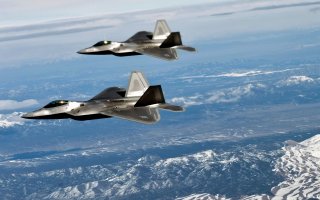Video: Watch the U.S. Air Force's F-22 Raptor in Action
The F-22 Raptor is a weapon to be reckoned with.
Here's What You Need to Know: The F-22 jet is America’s leading fifth-generation stealth air superiority fighter, introduced in 2005 as a replacement to both the F-15 and F-16 Cold War-era aircraft.
Earlier this month, the F-22 Raptor demonstration team marked Veteran’s Day with a breathtaking promotional video.
Coming in at just under three minutes long, the video opens with a slick reel of Maj. Joshua “Cabo” Gunderson getting ready for take-off. The video sets a new standard for production value in the military hardware domain, capturing the F-22 in crisp detail and at numerous angles, all in silky-smooth slow motion. Gunderson enters a steep climb after taking off and can be seen performing additional maneuvers throughout the video.
The promotion was shot at Joint Base Elmendorf-Richardson in Anchorage, Alaska. The clip is heavily edited and enhanced for dramatic effect, so it’s impossible to make out the full sequence of maneuvers. However, one thing is clear: from the impeccable 4K resolution to the gorgeous backdrop of the Chugach mountains, this is the best that the F-22 has ever looked on screen. Though the main focus is on the F-22 jet’s aerodynamic performance, we do catch some brief glimpses inside the cockpit and into the F-22 jet’s internal weapons bay. In what is undoubtedly a welcome addition, the team also published a 360 VR edition video aimed at giving the viewer the sensation of piloting an F-22 jet.
The F-22 jet is America’s leading fifth-generation stealth air superiority fighter, introduced in 2005 as a replacement to both the F-15 and F-16 Cold War-era aircraft. The F-22 jet brought not only superior raw performance but a raft of avionics updates, including a sensor fusion suite to promote situational awareness, powerful new radar and accompanying data processors, as well as a glass cockpit with digital controls. Although intended primarily for air-to-air roles, the F-22 jet can alternatively internally store two Joint Direct Attack Munitions or four GBU-39 guided bombs for secondary strike mission capability. The F-22 jet program ended prematurely in the late 2000s, with only 187 serial units instead of the scheduled 750, due to rampant costs and the then-lack of comparable peer competitors among U.S. rivals.
The F-22 jet demonstration team’s November performance is yet another affirmation that the F-22 jet truly shines in an air show format, boasting thrust vectoring capabilities and a slew of other agility-informed design decisions that facilitate the impressive aerobatics we’ve seen from F-22 demo pilots over the years. The F-22 demo team is no stranger to viral outreach campaigns, having published a popular video offering a view inside the F-22 cockpit in the summer of 2019.
The F-22 demo team is stationed in Virginia’s Langley Air Force Base and has been led by Gunderson since the beginning of this year. The team’s performance schedule has been greatly curtailed due to the coronavirus pandemic, but there have been a few major F-22 events in the second half of 2020. The team flew last month during the Wings Over Houston charity airshow, and also at the 2020 Stuart Air Show in Florida.
As of the time of writing, it appears that there are no further F-22 performances scheduled for the remainder of 2020.
Mark Episkopos is a national security reporter for the National Interest.
This article first appeared in November 2020.
Image: Flickr / U.S. Air Force

